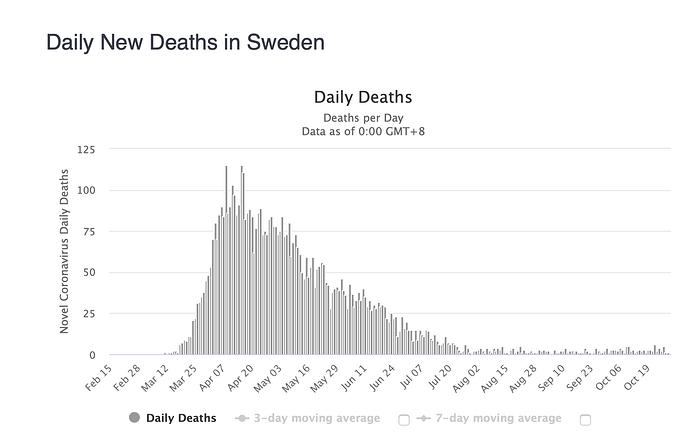Aren’t they doing well again?
The Great Barrington Declaration
I think what Doug is saying is that the body uses up it’s vitamin D stores, much as it does cholesterol, in fighting the infection.
Yes, exactly - that sounds like a logical and targeted strategy (three-week plans for 3 specific areas to make sure hospitals don’t get overwhelmed) but it’s hard to imagine that it would work in the US.
Yes - the idea is that the observed lower levels of the vitamin in people may be due to some of it getting used up as the body fights the virus. I don’t know if it’s been looked at, i.e. checking people before a severe infection and then in the course of it or afterward.
I am so glad these doctors chimed in. NOT.
I think most of us have common sense.
Actually there is a valid way to compare the effects of different policies and it is done all the time…you compare other countries’ results, which have used a different policy approach and there is data that does just that.
This Barrington Declaration is totally bizarre.
It means that I couldn’t care less what the doctors think nor their declarations.
There’s so much variation from country to country. Age, vitamin D status, percentage of households that have one person, levels of co-morbities, at what point the virus hit that particular country… it’s a really long list of confounding variables. Sweden did far better than Spain, Belgium, the UK, the US. Does that mean you embrace the Swedish approach? Or perhaps we should do exactly what Greece did? (what did Greece do?)
What’s bizarre about it?
I just read through it and it seems the epitome of common sense. What is it that you find contrary to common sense in the declaration?
Can’t follow your logic here.
New Zealand did and is doing way better than Sweden and all the countries you list.
As did Australia.
As did Taiwan.
Stick with the winners’ strategies usually works.
The NZ strategy is great if you have advance warning of the virus, I think Australia as well - so it’s a lovely idea but not applicable to most of the rest of the world. By the time we realized what was going on, COVID was widespread in Europe and the NE US.
What did Taiwan do? Would it be applicable in other countries?
People keep citing New Zealand but without taking into account that they were lucky enough not to have a whole load of Covid-19 infected people in the country before anyone even knew that something nasty was coming out of Wuhan.
By the time the Chinese Communist Party had disclosed to the world that they had a bit of a problem countries such as Italy, Spain and UK had already had many travellers arrive, or arrive home, carrying the virus. It was no longer possible to pull up the drawbridge and keep it out.
With Sweden it is worth observing that they allowed the virus to move through the population without causing too much disruption to people’s lives. Yes, they lost a lot of their elderly and some of their Vitamin D deficient (mostly immigrants from equatorial countries such as Somalia) population but there are not huge numbers of admissions to hospitals now nor is their death rate rising again.
We (UK) should have let it pass through our population in summer when people would have been most likely to fight it off. Instead of which, we kicked the can down the road so that more of us can suffer worse illness as we head into winter.
I signed the Barrington Declaration and would do so again.
Plus of course if/when the virus does hit NZ it will be devastating as they’ll have far less immunity.
I think they’re hoping that they can continue with short extreme lockdowns until there’s a vaccine.
Although I’ve come to really hate the idea of shutdowns and lockdowns - so much collateral damage, much of which is hard to measure - I think that if I were running policy in a place that had so much advance warning and a relatively small population, I’d be very tempted to take the NZ approach. If you can continue life as usual in between the lockdowns, and if the lockdowns are short-term and the parameters very clearly defined… idk, that makes some sense to me.
I think one of the hardest aspects of this for mental health, at least here in the NE United States, is that there’s no end in sight. First it was about flattening the curve, and now it seems to be about more generally controlling the spread of the disease, and there’s even some talk of “eradicating” the virus. Spring 2022 is now being mentioned as a possible time for many aspects of life to start back up. If there were no cost to that, I’d be all for it, but it seems to me that the cost is staggering and is falling predominantly on our youngest citizens.
I think Taiwan is actually in that same category of identifying local cases early, so that swift (and extreme) action makes a lot of sense.

